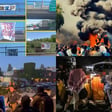
The Murder of Ayşenur Ezgi Eygi and the Future of International Solidarity
On September 6th of last year, 26 year old University of Washington graduate Ayşenur Ezgi Eygi was shot and killed by IDF soldiers while doing accompaniment in the West Bank of Palestine with International Solidarity Movement (ISM). In this episode, we speak with a friend of Ayşenur's who had travelled to the West Bank to do accompaniment with ISM alongside her, and was present during the days leading up to and immediately after her murder.
We discuss what happened to Ayşenur, settler violence against Palestinians and IDF complicity, grief, remembrance, and ways in which anarchist movements internationally can effectively support people facing violence from the state and occupying forces.
During the discussion a number of pieces are referenced:
"Theses On Palestine Solidarity" (anonymous): https://haters.noblogs.org/files/2024/01/Theses-on-Palestine-Solidarity.pdf
"The Gaza Ghetto Uprising" (Adi Callai*): https://m.youtube.com/watch?v=Pt_1k7nSv1M&pp=ygUUZ2F6YSBnaGV0dG8gdXByaXNpbmc%3D
"The Gaza ceasefire will not cure the wounds of genocide" (Roaa Shamallakh): https://mondoweiss.net/2025/01/the-gaza-ceasefire-will-not-cure-the-wounds-of-genocide/
For more information about Ayşenur and her murder at the hands of the IDF, please see https://www.realchangenews.org/news/2024/10/02/remembering-ay-enur-activist-s-death-felt-deeply-seattle-and-beyond and https://southseattleemerald.org/voices/2024/09/10/aysenurs-legacy-the-tragic-loss-of-an-activist-a-friend-and-a-fighter-for-international-solidarity
The speaker interviewed on this episode does not represent the views of International Solidarity Movement. For more about the work of ISM, visit their website at:https://palsolidarity.org/
This interview was originally conducted immediately following the agreement to a ceasefire between the IDF and Hamas, on January 16th, 2025. We apologize for the delayed release.
*Adi Callai has previously been interviewed by contributors to this show. Shortly following the October 7th attacks, they appeared on "This is America" (with Tom Nomad) to discuss IDF strategy (https://itsgoingdown.org/counter-insurgency-israel-podcast/).




